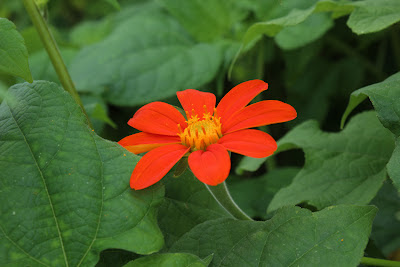 |
| Yardlong beans and morning glories in the Learning Garden |
A recent Stanford University study made news by casting doubts upon whether organic food is, simply by being organic, healthier for us than non-organic food. The news coverage of the story featured many people being surprised about the fact that organic farms do use pesticides and fertilizers (ones that are on a list approved by the Organic Materials Review Institute), and that organic food does not automatically provide more nutrition or health benefits to its consumers. One radio report hinted at the fact that 'organic' might just be a ploy by some big companies to be able to charge unsuspecting customers more for healthier-sounding food.
 |
| B to F: tomatoes, broccoli, and turnips |
I've been mulling over what troubles me about this the coverage of this study (actually a meta-study, which examined a large amount of data collected in experiments over the past couple of decades). I've read Michael Pollan's response, as well as the argument from Marion Nestle (written prior to the Stanford study's publication) about the ongoing controversy over organic food, and I think I've figured out what it is: for many of us who farm organically, who are not associated with big companies or even big agriculture, organic is not just a consumer label. In many ways, it has very little to do with how we market our products.
 |
| PYO husk cherries, also known as groundcherries |
Organic farming is about how we grow, why we do what we do, and our desire to make a positive impact on the world. I chose organic farming as a profession because I believe that organic production is a scientifically based attempt to create an agriculture that produces economically viable yields of beautiful, nutritious vegetables while remaining as beneficial to the environment, and to farmworkers, as possible. While I often shorten it to "farmer" when I'm describing what I do, in my heart of hearts, I'm an organic farmer.
 |
| Okra flower and young pods |
To me, organic doesn't mean boutique farming or baby vegetables, or getting the highest price we possibly can for our crops. The higher price for organic food is only justified because sometimes it costs more money to grow in a way that is more environmentally thoughtful; composted dairy manure, for example, costs more than synthetic petrochemical fertilizers but is less likely to create pollution if it is well-managed. (In an ideal world, the cows that produce that manure would also live on the organic farm, but our agricultural world, especially in our urban area, is very much less than ideal.) Organic farming, to me as a grower, means that I can almost always eat what I grow right out of the ground; it means that my children, and our shareholders, and the people who work on the farm day in and day out, can walk through the fields, pick their own food, and generally eat from the land in a way that minimizes the amount of pesticides they are exposed to. It means making a conscious effort, day in and day out, to farm in a way that builds healthy soil that grows healthy food.
 |
| B to F: carrots and bush beans (and some weeds) |
Organic farming isn't perfect. It can be fuel intensive, input-heavy, labor intensive, expensive, and heartbreaking. Growing three rows of fennel on a four-foot-wide, two-hundred-foot long bed is certainly not mimicking any natural system I've ever come across. The pesticides that we are allowed to use under the standards approved by the USDA are not harmless, non-toxic plant compounds; some of them are deadly chemicals that happen to be naturally derived. Not only that, they are not as effective as the deadly synthetic chemicals that conventional farmers are allowed to use.
 |
| Tithonia, also known as Mexican sunflower |
There is much that is still unknown about the way soil functions naturally and how we can build a functioning soil ecosystem that grows nutritious organic vegetables. And the truth is that not all organic farmers are good farmers; some of us, while well-intentioned, are still learning -- farming, after all, is an art as much as a science, and organic farming takes years of practice to learn well. A wise, experienced conventional farmer may well grow food with more nutritional value than a sloppy, inexperienced, or negligent organic farmer. A master farmer -- of any stripe -- is one who grows bountiful yields of highly nutritious vegetables from highly functioning soil; I just happen to believe that organic methods are the road I want to take to get to that level, if I ever do.
 |
| Farm-to-plate: a late summer meal made from Waltham Fields' vegetables |
There are very few things that I'm willing to say I believe in as I get older. Even the Red Sox are not what they used to be. And 'big organic' is definitely not what 'organic' used to be. For better or for worse, organic farming has come a long way from the days of back-to-the-landers with their bug-riddled zucchini and kale. But the fundamental idea of trying to grow healthy food -- and lots of it -- in a way that is kinder to the earth and to those who work it is one that I do believe in and try to manifest every day. Making that food available to everyone in our society is another idea I believe in. And I am truly grateful that, day in and day out, I can practice something that I deeply believe, regardless of the study of the day or the food fad of the week. That's why we grow organically at Waltham Fields.
Hope you enjoy the harvest,
Amanda, for the farm crew
Images by Rebekah Carter (2012).
No comments:
Post a Comment